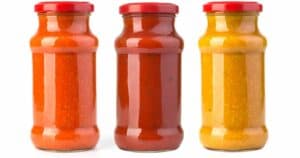Do you love dousing your food in hot sauce, but worry about what it might be doing to your insides? If you’re a fellow hot sauce lover, you can relate to both craving that addictive spicy kick and feeling concerned about possible stomach issues like heartburn.
The good news is that hot sauce can potentially benefit your health and metabolism when consumed in moderation. The not-so-great news is that too much can irritate your stomach and cause problems, especially if you already deal with digestive conditions like IBS or frequent acid reflux.
In this article, we’ll explore the pros and cons of hot sauce for your stomach and digestion. You’ll learn some science-backed benefits that may surprise you, along with tips to enjoy hot sauce without wreaking havoc on your digestive system.
First, let’s look at how compounds within hot sauces like the popular Tabasco and Sriracha can be beneficial. Hot sauces get their heat from capsaicin, found in chili peppers. Studies show capsaicin has anti-inflammatory effects and may boost metabolism. This can potentially help speed up weight loss. Hot sauces also contain little to no calories, carbs, fat or protein. This makes them a waistline-friendly topping. Additionally, capsaicin has been linked to improving heart health markers like blood pressure.
However, capsaicin and other hot sauce ingredients can irritate the stomach lining and esophagus. Too much can cause painful indigestion, cramps or the dreaded “fire in the hole” effect. Frequent hot sauce lovers with sensitive stomachs or conditions like IBS may experience worse symptoms if consuming it daily. Store-bought hot sauces also sometimes contain preservatives and additives that may negatively affect digestion.
The key is enjoying hot sauce in moderation as part of an overall healthy diet. Avoid excessive amounts and overly processed versions with artificial ingredients. Pay attention to your body’s signals. If you experience regular stomach troubles like heartburn after eating hot sauce, it may be time to pull back. Consulting a doctor is wise if you have ongoing digestive issues.
With some care and caution, you can continue to
How Hot Sauce Impacts Your Stomach
Hot sauces get their signature burn from a compound called capsaicin found in chili peppers. Capsaicin triggers receptors in your mouth and throat that sense heat and pain, giving you that intense fiery sensation.
When you ingest capsaicin, it can also activate your body’s TRPV1 receptors, which are found in your stomach, intestines, and colon. This stimulates gastric cells to release more mucus and bicarbonate, which are natural antacids and protectants.
However, capsaicin and other compounds in hot sauce can also irritate the sensitive lining of your upper digestive tract. This includes your esophagus, stomach, and small intestine. Too much can negatively impact your digestion and cause uncomfortable side effects.
Benefits of Hot Sauce for Your Stomach
While hot sauce can clearly bring the heat, research shows it provides some benefits for your gut health and metabolism when consumed in moderation. Here are some of the positives:
May Boost Metabolism
Several studies reveal that capsaicin and other chili pepper compounds can give your metabolism a modest boost. They activate brown fat cells, which ramp up calorie and fat burning. Capsaicin may also reduce appetite by decreasing levels of the hunger hormone ghrelin. This one-two punch makes hot sauce a metabolism-friendly choice.
Improves Heart Health
Population studies associate chili pepper consumption with better cardiovascular health. Capsaicin helps improve blood flow, blood pressure, and cholesterol levels. This can reduce your risk for heart disease and stroke.
Anti-Inflammatory Effects
The capsaicin in hot peppers exhibits potent anti-inflammatory properties. Chronic inflammation is linked to many diseases. So, enjoying spicy foods may help reduce overall inflammation.
May Aid Weight Loss
Thanks to capsaicin’s metabolism-boosting and appetite-suppressing effects, adding hot sauce to your diet can potentially help speed up weight loss. Hot sauce is also calorie-free, making it a waistline-friendly topping.
Potential Downsides of Hot Sauce
However, as mentioned earlier, hot sauce can also irritate the digestive tract and cause some unpleasant symptoms if you go overboard. Here are some potential drawbacks to be aware of:
Heartburn and Reflux
Frequent or excessive hot sauce intake can worsen gastroesophageal reflux disease (GERD). The peppers’ irritating compounds relax the lower esophageal sphincter muscle, allowing stomach acid to back up and cause painful heartburn.
Stomach Pain and Cramps
Capsaicin can inflame the stomach lining, causing abdominal pain and cramps. If you already have a sensitive stomach or digestive issues like IBS, hot sauce may worsen discomfort.
Mouth and Throat Burning
Some hot sauces contain extract oils that are stronger than capsaicin alone. These can cause extreme mouth and esophageal burning, even in
May Trigger IBS Symptoms
IBS sufferers often note hot peppers trigger symptoms like abdominal pain, bloating, and diarrhea. For those with irritable bowel syndrome, daily hot sauce may exacerbate issues.
Contains Preservatives and Additives
Many commercial hot sauces include preservatives like potassium sorbate and sodium benzoate. They help extend shelf life but can provoke reactions in sensitive individuals.
Can Cause Anal Burning
Yes, that capsaicin can burn on the way out too! If you’ve ever felt like you were “breathing fire” from your behind, hot sauce compounds are to blame.
Now that you know how hot sauce affects your stomach, here are some tips on safely enjoying it without digestive grief.
How to Eat Hot Sauce If You Have a Sensitive Stomach
With a little care and moderation, those with sensitive digestion can still
- Watch your dosage: Don’t drench food in hot sauce. Start with small amounts and work up slowly to assess your tolerance.
- Avoid hot sauce on an empty stomach: Eat it with a meal to reduce gastric irritation. Food helps absorb and dilute the spicy compounds.
- Choose milder varieties: Opt for mild chili-based hot sauces, not extreme extract-based ones.
- Read labels: Select brands without additives like preservatives, artificial colors and flavors.
- Use antacids if needed: Pair hot sauce with antacids to counteract possible acid reflux.
- Pay attention to your symptoms: If you experience regular stomach discomfort, reduce your hot sauce intake.
- See your doctor if concerns persist: Get assessed if you have ongoing abdominal pain, heartburn or digestion issues.
With the right precautions, you can keep enjoying your beloved hot sauce without sacrificing your stomach’s health. Use these tips to find your tolerance threshold and make spicy flavors part of an overall balanced diet.
Frequently Asked Questions
1. Is hot sauce bad for your stomach?
Hot sauce is not inherently bad for your stomach health. The key is moderation. Consumed in reasonable amounts as part of an overall healthy diet, hot sauce can be safely enjoyed by most people. However, excessive intake, especially on an empty stomach, may irritate the digestive tract and cause problems in those with sensitive stomachs.
2. Can hot sauce cause gastritis?
Yes, overconsumption of hot sauces may worsen or provoke gastritis (stomach inflammation) in some individuals due to irritation of the stomach lining. Those with a history of gastritis likely need to limit their intake to prevent flare ups.
3. Will hot sauce help with digestive issues?
There is no evidence that hot sauce itself can relieve digestive troubles. In fact, it may worsen common issues like acid reflux and IBS for some. However, the capsaicin in hot peppers does appear to stimulate protective gastric mucus production.
4. What hot sauces are least likely to cause stomach issues?
Milder hot sauces made from real chili peppers, without extract oils, are less likely to provoke stomach problems in most people. Start with jalapeno or habanero-based sauces instead of extreme ghost or scorpion pepper varieties.
5. How can I prevent hot sauce heartburn?
To help avoid heartburn, limit overall intake, avoid extreme varieties, consume with food, start slowly, and pair with antacids if needed. Pay attention to personal tolerance levels as well. Those with frequent reflux may need to avoid it altogether.
The Bottom Line on Hot Sauce and Your Stomach
Moderately spicing up meals with hot sauce can provide health benefits thanks to capsaicin’s anti-inflammatory effects and metabolism-boosting properties. But excessive amounts may worsen reflux, heartburn, IBS, and general stomach irritation.
By starting slowly, choosing milder varieties, reading labels, and not consuming it on an empty stomach, you can continue to enjoy your favorite fiery condiment as part of an overall healthy diet. Pay attention to your body’s signals and scale back your intake if hot sauce consistently causes stomach troubles.
To summarize key points:
- Hot sauce gets its heat from capsaicin, which can irritate the digestive tract but also offer health benefits.
- Research shows links to improved metabolism, heart health, anti-inflammation, and potential weight loss aid.
- However, it may worsen reflux, heartburn, IBS and stomach issues, especially in excess.
- Enjoy hot sauce in moderation as part of a healthy diet by starting slowly and choosing milder, natural brands.
- Reduce intake if you experience regular digestion problems after eating hot sauce.
With a little care and common sense, both your taste buds and stomach can enjoy hot sauce without unwanted side effects.





